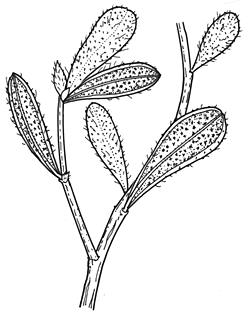Common name: Rough Guinea Flower
Hibbertia aspera DC. APNI* 
Description: Ascending or erect shrubs to 60 cm high, villous to pubescent with simple and stellate hairs.
Leaves obovate to oblanceolate, 4–20 mm long, 2–7 mm wide, apex obtuse to rounded to truncate or emarginate, base tapering, margins recurved; upper surface at first hairy with a few simple hairs or rarely stellate hairs, becoming ± glabrous, with wart-like bases of hairs remaining, lower surface densely stellate-hairy, velvety to pilose.
Flowers terminal, 1–3, 2–7 mm long; peduncles 12–15 mm long. Sepals 3–4 mm long, outer surface shortly stellate-hairy, sometimes hairs with unequal branches and surface appearing pilose. Petals 3–6 mm long. Stamens usually 4–6 mm long, on one side of the carpels. Carpels 2, stellate-hairy.
Flowering: Flowers mainly summer.
Distribution and occurrence: In heath or open forest, on sandy soils, mainly in coastal areas.
NSW subdivisions: NC, CC, SC, NT, CT, ST
Other Australian states: Qld Vic.
There are hybrids between H. aspera subsp. aspera and H. empetrifolia subsp. empetrifolia with an a high percentage of abnormal pollen in areas where the two species grow together, e.g. at Thirlmere, Picton Lakes and Green Cape.
Text by G. J. Harden & J. Everett
Taxon concept:
| | Key to the subspecies | |
| 1 | Upper leaf surface pubescent to puberulous, becoming glabrous, and covered with ( smooth warts, with often depressed stellate hairs, with few much longer simple hairs; lower surface velvety. | subsp. aspera |
| Upper leaf surface pilose to pubescent becoming glabrous with raised warts, with erect radial to antrorsely curved stellate hairs and ( simple hairs; lower surface pilose to velvety, scarcely overlapping erect stellate hairs and a few simple hairs. | subsp. pilosifolia |
APNI* Provides a link to the Australian Plant Name Index (hosted by the Australian National Botanic Gardens) for comprehensive bibliographic data
***The AVH map option provides a detailed interactive Australia wide distribution map drawn from collections held by all major Australian herbaria participating in the Australian Virtual Herbarium project.
|


